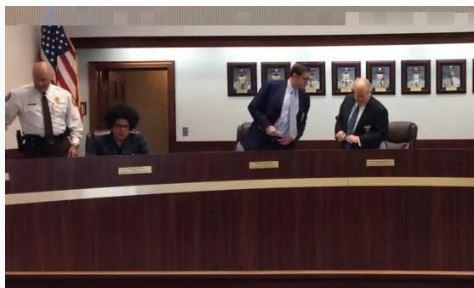Lt. Col. Mary Barton was named St. Louis County’s chief of police on Thursday.
CREDIT ST. LOUIS COUNTY POLICE DEPARTMENT
St. Louis County has its first female chief of police.
The Board of Police Commissioners announced Thursday it selected Mary Barton, who currently commands the West County Precinct, to lead the department starting May 1.
“The Board listened to the community, worked fast and hard to complete the selection process. The Department needs consistent and steady leadership as it deals with COVID-19 and the other challenges facing all police departments in this nation,” Ray Price, the chairman of the board, said in a statement.
Barton, 62, was promoted from the rank of captain to lieutenant colonel on Thursday. When she takes over as chief, replacing the retiring Jon Belmar, she will be promoted to colonel.
She joined the department in 1978 and has served in a variety of roles, including as an instructor in the St. Louis County and Municipal Police Academy on cultural diversity.
“Lieutenant Colonel Barton is an experienced leader with a ‘clear vision’ of an equitable future for both the department and the community we serve,” Dr. Laurie Punch, a member of the police board, said in a statement.
The lack of diversity among command staff had been a concern of activist groups and the Ethical Society of Police, which advocates for officers of color. Of the 23 officers who were eligible to apply for chief, five were men of color. Barton and one other white woman were eligible — there are no women of color who currently hold the rank of captain or lieutenant colonel in the department, which was a requirement for applying.
The Ethical Society said in a statement released Friday that it hoped Barton would listen to its members.”
“African-American Officers have faced unbelievable challenges with our voices being heard under former Chief Jon Belmar, former County Executive Steve Stenger and the current County Executive, Sam Page,” the association said. “We are more than willing to work with Chief Barton and we will support efforts with fairness, diversity and inclusion for all officers and citizens.”
Joe Patterson, the executive director of the St. Louis County Police Officers Association, the union that represents the department, said members looked forward to working with Barton.
“Women represent the fastest-growing demographic of law enforcement officers, and Lt. Col. Barton’s appointment is a beacon of light for those officers,” Patterson said.
COVID-19 preparations
Also on Thursday, the board heard from Belmar on the department’s preparations to deal with potential staffing shortages caused by the coronavirus.
Because school resource officers are no longer needed with schools currently are closed, Belmar said, staffing levels are currently higher than normal. He said the department has a plan in place in case officers are exposed to or infected by COVID-19, the illness caused by the coronavirus.
“I said at a press conference the other day, when you need law enforcement, you will get law enforcement,” Belmar told the Board of Police Commissioners on Thursday. “You have my commitment, we will continue to do that. We may have to do some remarkable things to preserve that manpower. We’re going to see. But we have a good plan for that.”
Belmar did not immediately make details of the plan available, saying he expects to sign a special order implementing it soon. But he said the chiefs in the St. Louis region have signed an agreement to share personnel and resources if needed.
The plan may include asking retired officers to come back to the force as needed. Former chief Tim Fitch, now a member of the St. Louis County Council, told St. Louis Public Radio earlier this month that he had received a memo asking if he would be willing to volunteer if the outbreak requires extra staffers.
The department is concerned about the current lack of personal protective equipment like masks and paper gowns for the officers, Belmar said.
“We have some personal protective equipment, but we need more than we have. We are hoping to get that equipment shortly, and the faster that we can get more equipment — because we will burn through it — the better off we’re going to be.”
The public could only watch the commissioners’ meeting on a livestream – part of the department’s efforts to reduce potential exposure to the virus.

